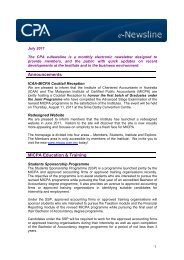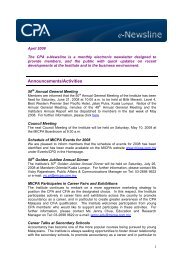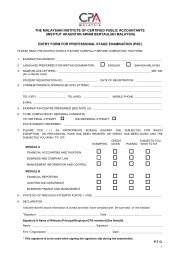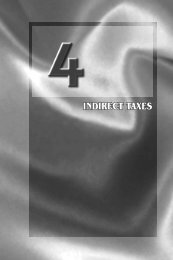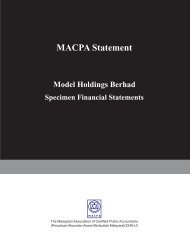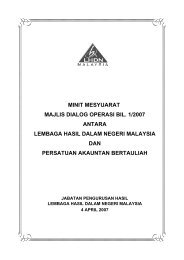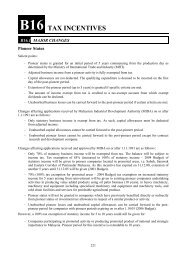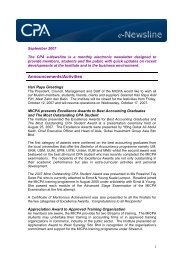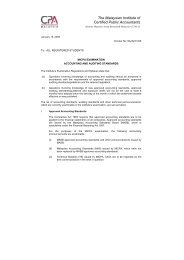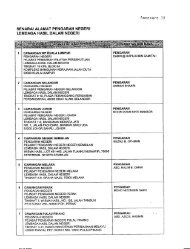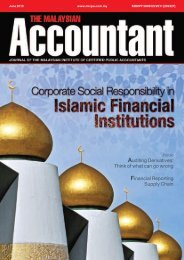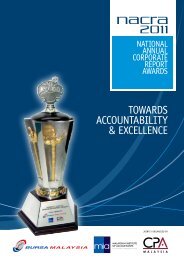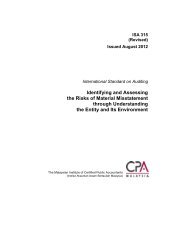The Malaysian Accountant - The Malaysian Institute Of Certified ...
The Malaysian Accountant - The Malaysian Institute Of Certified ...
The Malaysian Accountant - The Malaysian Institute Of Certified ...
Create successful ePaper yourself
Turn your PDF publications into a flip-book with our unique Google optimized e-Paper software.
IASB UpdateIASB welcomes US SEC proposal toallow IFRSs without reconciliation<strong>The</strong> International Accounting Standards Board (IASB)welcomes the decision of the US Securities and ExchangeCommission (SEC) to propose allowing non-US companies tofile financial results according to International FinancialReporting Standards (IFRSs) as approved by the IASB.<strong>The</strong> change would permit non-US companies to access UScapital markets without reconciliation with US GenerallyAccepted Accounting Principles (GAAP) by 2009. <strong>The</strong> SECemphasised that this proposal applies only to thosecompanies filing financial statements according to full IFRSs.<strong>The</strong> SEC’s decision reflects the increasing acceptance of IFRSsas a widely used and high quality financial reportinglanguage. It also proves the significant progress that has beenmade in the convergence process between the IASB and the USFinancial Accounting Standards Board (FASB).Sir David Tweedie, IASB chairman, commented on theimportance of the SEC decision: <strong>The</strong> SEC’s proposal shows itsrecognition of the tangible benefits of a single set of financialreporting standards used in the world’s integrating capitalmarkets and the relevance of the continuing IASB-FASBconvergence process to the economies of the US and the restof the world. If approved, the rule will eventually reducesignificantly the barriers to capital flows between countriesusing full IFRSs and the United States.“We appreciate the SEC’s continued support of our work.Our ultimate aim at the IASB is to have a single set ofaccounting standards used worldwide. <strong>The</strong> SEC’s proposal isan important step in achieving that goal, but much workremains to be done,” he said.(Source: www.iasb.org)IFRIC UPDATEIFRIC issues guidance on customerloyalty programmes<strong>The</strong> International Financial Reporting InterpretationsCommittee (IFRIC)* issued an Interpretation, IFRIC 13Customer Loyalty Programmes.<strong>The</strong> Interpretation addresses accounting by entities thatgrant loyalty award credits (such as ‘points’ or travel miles)to customers who buy other goods or services. Specifically, itexplains how such entities should account for theirobligations to provide free or discounted goods or services(‘awards’) to customers who redeem award credits.<strong>The</strong> Interpretation requires entities to allocate some ofthe proceeds of the initial sale to the award credits andrecognise these proceeds as revenue only when they havefulfilled their obligations. <strong>The</strong>y may fulfil their obligationsby supplying awards themselves or engaging (and paying)a third party to do so.<strong>The</strong> effect of the Interpretation will be to ensure thatobligations to supply customer loyalty awards are measuredthe same way, whether the award credits are sold separatelyor granted to customers as part of a larger sale.Introducing IFRIC 13, Robert Garnett, IFRIC Chairmanand IASB member, said: “Until now, international standardshave lacked clear guidance for award credits granted ‘free’with other goods or services. <strong>The</strong> Interpretation willstandardise practice in a way that reflects our view thatloyalty awards are separate goods or services for whichcustomers are implicitly paying.”(Source: www.iasb.org)IFRIC publishes proposed guidanceon real estate sales<strong>The</strong> IFRIC released for public comment a draft Interpretation,IFRIC D21 Real Estate Sales. <strong>The</strong> proposals were open for publiccomment until October 5, 2007.<strong>The</strong> proposed Interpretation aims to standardiseaccounting practice among real estate developers for sales ofunits, such as apartments or houses, ‘off plan’, i.e. beforeconstruction is complete.At present, real estate developers interpret InternationalFinancial Reporting Standards (IFRSs) differently and recordrevenue for the sale of the units at different times. Somerecord revenue only when they have handed over thecompleted unit to the buyer, while others record revenueearlier, as construction progresses, by reference to the stageof completion of the development.IFRIC D21 proposes that revenue should be recorded asconstruction progresses only if the developer is providingconstruction services, rather than selling goods (completedreal estate units). It proposes features that indicate that theseller is providing construction services. In many countries,these features tend currently not to be present, in typical offplan sale agreements.IFRIC D21 Real Estate Sales is available for eIFRSsubscribers from today and will be freely available on theIASB Website.(Source: www.iasb.org)46 | <strong>The</strong> <strong>Malaysian</strong> <strong>Accountant</strong> | June/August 2007 www.micpa.com.my



